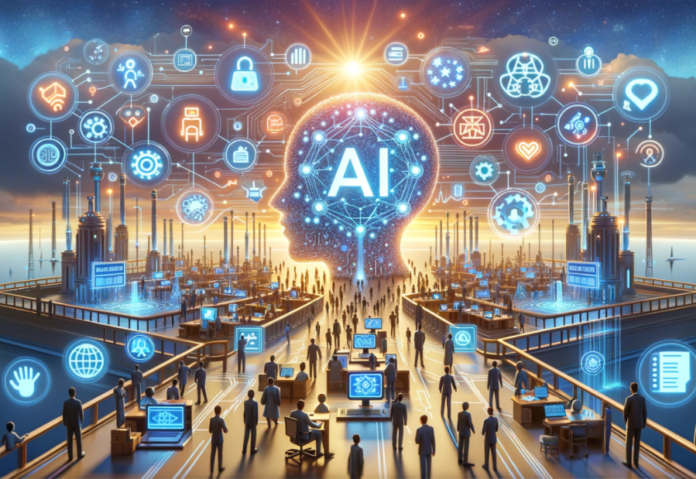The swift development of artificial intelligence (AI) is expected to drastically alter sectors as 2025 approaches, surpassing the impact of 2024. A wider integration of AI into everyday life and corporate operations is anticipated in 2025, despite the notable advancements made in areas like generative AI, tailored applications, and AI risk management last year. Here are some predictions about the upcoming stage of AI innovation.
Hyper-Personalization: AI Tailoring Experiences in Real Time
By improving customer experiences, AI-driven customization revolutionized sectors in 2024. But in 2025, real-time hyper-personalization will advance this. Personalization will extend beyond digital platforms thanks to increasingly complex algorithms and AI’s interaction with the Internet of Things. Consider healthcare systems that dynamically modify treatments depending on patient data in real-time, or retail settings where each customer’s purchases and promotions are customized as they move through the store.
It is anticipated that this development will greatly boost user engagement and client loyalty, turning personalization from a desirable feature to a need for businesses across all sectors. Businesses will employ AI to anticipate client requirements before they even become apparent, solidifying AI’s position as a key factor in customer satisfaction as intelligent assistants become more common.
Generative AI Becomes Mainstream
While generative AI grew popularity in 2024 and would be completely incorporated into all industries by 2025. From R&D to content creation, generative AI will be an essential tool. Generative models will significantly speed up personalized medicine and drug discovery in the healthcare industry, enabling innovations in the treatment of uncommon diseases and the customization of medications to each patient’s unique genetic profile. Similar to this, AI will transform the planning and construction of cities and infrastructure by designing buildings based on human behaviour and environmental elements in sectors like architecture.
Generative AI will improve creative processes for firms, allowing for quicker innovation cycles and cutting down on the time and expense needed to create new goods. This will have a particularly significant effect on sectors like marketing, entertainment, and fashion, where AI-generated designs and content will become commonplace.
Quantum AI: The Next Frontier of Computational Power
Additionally, quantum AI will transition from experimental to real-world uses around 2025. This technology will solve previously intractable issues by combining artificial intelligence (AI) with the enormous processing capacity of quantum computing. By completing intricate calculations in seconds that would take traditional computers years to complete, quantum artificial intelligence will transform domains like financial modeling, materials science, and cryptography.
For companies, this translates into improved financial forecasts, quicker supply chain optimization, and advances in machine learning models that can instantly process enormous volumes of data. Quantum artificial intelligence is predicted to reach a multibillion-dollar market by 2030, with significant ramifications for sectors like finance, cybersecurity, and medicines.
AI Governance and TRiSM: Ensuring Ethical AI
Concerns regarding the ethical application of AI are growing along with its influence. The industry will adopt AI Trust, Risk, and Security Management (TRiSM) as a standard by 2025. To make sure that AI systems are transparent, objective, and safe, businesses will need to implement TRiSM frameworks. Organizations will need to have strong AI governance systems in place to remain compliant with the new rules governing the use of AI data and privacy.
Making sure AI models produce judgments that humans can comprehend and review will be the main goal of AI governance. This would lessen dangers like algorithmic bias in decision-making, worries about data privacy, and the possible abuse of AI in delicate fields like healthcare and law enforcement. Businesses who don’t put AI governance procedures in place run the danger of lagging behind in terms of innovation and customer trust by 2025.
AI and Robotics: Automation Beyond the Factory Floor
Automation has historically only been used in manufacturing and shipping, but by 2025, AI-powered robotics will be used in other industries. AI-powered robots in healthcare will help with patient care, surgery, and diagnostics, increasing the precision and speed of medical treatments. AI-powered agricultural robots will improve precision farming and crop monitoring, boosting yields while cutting waste.
Customer service will also be automated by AI, with intelligent robots becoming ubiquitous in banking, hospitality, and retail. In addition to doing repetitive duties, these robots will offer individualized customer service, freeing up human employees to concentrate on more difficult problems.
Conclusion: 2025 – The Year of Ubiquitous AI
With advancements that will completely change how we live and work, 2025 is predicted to be a turning point for AI. The future of artificial intelligence promises quicker, more effective, and more integrated solutions for every industry, from hyper-personalized experiences to the emergence of quantum AI. Companies who adopt these developments will be in a strong position to take the lead in a world that is becoming more and more AI-driven.
As AI develops further, businesses will face challenges in both using new technologies and making sure they are used appropriately. The emphasis will move from merely implementing AI solutions to creating moral, open, and safe systems that serve society as a whole as AI governance becomes increasingly important.






